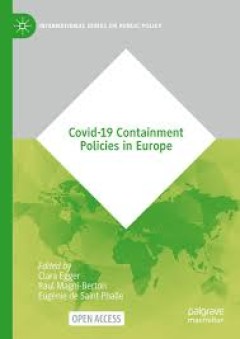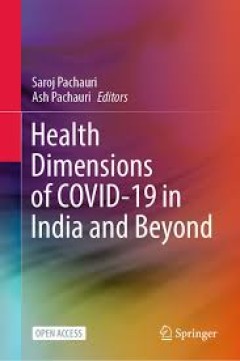Filter by

Biodiversity-Health-Sustainability Nexus in Socio-Ecological Production Lands…
This is an open access book. It is a compilation of case studies that provide useful knowledge and lessons that derive from on-the-ground activities and contribute to policy recommendations, focusing on the interlinkages between biodiversity and multiple dimensions of health (e.g., physical, mental, and spiritual) in managing socio-ecological production landscapes and seascapes (SEPLS). This bo…
- Edition
- -
- ISBN/ISSN
- 9789811698934
- Collation
- 286
- Series Title
- Satoyama Initiative Thematic Review
- Call Number
- -

Ageing and Covid-19 : Making Sense of a Disrupted World
This volume presents a range of research approaches to the exploration of ageing during a pandemic situation. One of the first collections of its kind, it offers an array of studies employing research methodologies that lend themselves to replication in similar contexts by those seeking to understand the effects of epidemics on older people. Thematically organised, it shows how to reconcile qua…
- Edition
- -
- ISBN/ISSN
- 9781000530971
- Collation
- -
- Series Title
- Social Perspectives on Ageing and Later Life
- Call Number
- -

Advances in Infectious Diseases and Clinical Microbiology during the COVID-19…
Background and Objectives: Aspirin (ASA) is a commonly used antithrombotic drug that has been demonstrated to reduce venous thromboembolism. The aim was to analyze if geriatric COVID-19 patients undergoing a 100 mg/day Aspirin (ASA) treatment prior to hospitalization differ in hospital outcome compared to patients without previous ASA therapy. Materials and Methods: An observational retrosp…
- Edition
- -
- ISBN/ISSN
- 9783036594682
- Collation
- 250
- Series Title
- -
- Call Number
- -

Covid-19 Containment Policies in Europe
This open access book examines the diverse strategies implemented by national and local European governments to contain the Covid-19 pandemic. Rather than focus on individual national case studies, it brings together leading scholars and policymakers to analyse the wide range of containment policies utilised across the continent at various levels of government. In doing so, the volume assesses …
- Edition
- -
- ISBN/ISSN
- 978-3-031-52096-9
- Collation
- -
- Series Title
- -
- Call Number
- -

Health Dimensions of COVID-19 in India and Beyond
On January 30, 2020, India reported the first case of COVID-19 in Kerala. The index case was identified as a student returning from Wuhan. As of February 3, 2020, a total of three cases were confirmed in Kerala. However, after a month the number of cases in the country increased dramatically. On March 14, 2020, India reported its first two COVID-19-related deaths. India’s case fatality ra…
- Edition
- -
- ISBN/ISSN
- 9789811673856
- Collation
- XXXIV, 355
- Series Title
- -
- Call Number
- -

FOLK DEVILS AND MORAL PANICS IN THE COVID-19 PANDEMIC
- Edition
- -
- ISBN/ISSN
- 9781003453222
- Collation
- -
- Series Title
- -
- Call Number
- -
- Edition
- -
- ISBN/ISSN
- 9781003453222
- Collation
- -
- Series Title
- -
- Call Number
- -

Connected in isolation :digital privilege in unsettled times
"A leading researcher explores digital disparity and the pandemic and asks: how did people of different backgrounds use digital media to negotiate the challenges of isolation, unemployment, home schooling, remote work, and COVID-19 itself? And how did digital technology intersect with existing social and economic disparities? Although it is undeniable that technologies helped facilitate numerou…
- Edition
- -
- ISBN/ISSN
- 9780262371506
- Collation
- 1 online resource
- Series Title
- -
- Call Number
- -

Emancipatory Feminism in the Time of Covid-19 Transformative resistance and …
The Covid-19 pandemic threw into stark relief the multi-dimensional threats created by neoliberal capitalism. Government measures to alleviate the crisis were largely inadequate, leaving women – in particular working-class women – to carry the increased burden of care work while at the same time placing themselves in direct risk as frontline workers. Emancipatory Feminism in the Time of Cov…
- Edition
- -
- ISBN/ISSN
- 9781776148301
- Collation
- -
- Series Title
- -
- Call Number
- -

Global Perspectives on Educational Innovations for Emergency Situations
This open access book focuses on making the transition from in-person, classroom education to other feasible alternative modes and methodologies to deliver education at all levels. The book presents and analyzes research questions to explore in this arena, including pedagogical issues relating to technological and infrastructure challenges, teacher professional development, issues of disparity,…
- Edition
- -
- ISBN/ISSN
- 9783030996345
- Collation
- -
- Series Title
- -
- Call Number
- -

Chapter Longitudinal profile of a set of biomarkers in predicting Covid-19 mo…
In survival analysis, time-varying covariates are endogenous when their measurements are directly related to the event status and incomplete information occur at random points during the follow-up. Consequently, the time-dependent Cox model leads to biased estimates. Joint models (JM) allow to correctly estimate these associations combining a survival and longitudinal sub-models by means of a s…
- Edition
- -
- ISBN/ISSN
- 9788855184618
- Collation
- -
- Series Title
- -
- Call Number
- -
 Computer Science, Information & General Works
Computer Science, Information & General Works  Philosophy & Psychology
Philosophy & Psychology  Religion
Religion  Social Sciences
Social Sciences  Language
Language  Pure Science
Pure Science  Applied Sciences
Applied Sciences  Art & Recreation
Art & Recreation  Literature
Literature  History & Geography
History & Geography